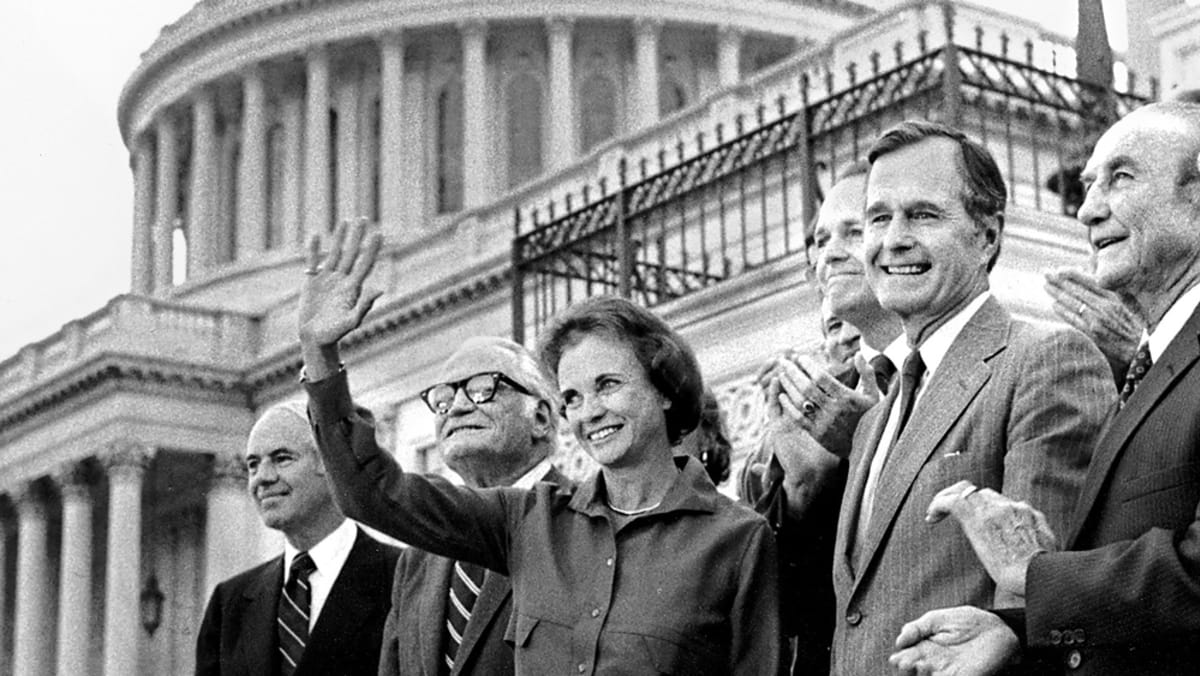First woman on the US Supreme Court, retired Justice Sandra Day O’Connor dies at 93

O’Connor described her tenure as similar to walking on wet cement “because every opinion you offer, you’ve left a footprint.”
With her ranch-bred work ethic and plain-spoken way, O’Connor’s mantra was “be constructive.”
Unlike any of the justices who served during her time, O’Connor had run for elective office and knew how to work a backroom and count votes. The former Republican state senator often strategized with individual justices to try to force the hands of others and reach the crucial five votes among the nine for a majority decision.
O’Connor avoided sweeping pronouncements and voted for incremental change, becoming a pivotal vote on the court in the process. Her views became more liberal with time. After expressing some ambivalence about Roe v Wade, the 1973 decision that made abortion legal nationwide, she created a critical alliance in 1992 to affirm Roe’s central holding.
“Some of us as individuals find abortion offensive to our most basic principles or morality but that cannot control (the court’s) decision,” she wrote.
The Supreme Court, which has had a 6-3 conservative majority since 2020, overturned the landmark Roe ruling in 2022.
While O’Connor was generally suspicious of racial remedies, she was a crucial vote in 2003 to uphold campus affirmative action favoring racial minorities in admissions.
O’Connor wrote in the ruling that colleges must strive for diversity “if the dream of one nation, indivisible, is to be realized.”
The Supreme Court’s conservative majority in June struck down race-conscious admissions programs in higher education, effectively prohibiting affirmative action policies long used to increase the number of underrepresented minority students in American colleges.
O’Connor’s views on gay rights evolved, too. In 1986 she voted to uphold a Georgia law prohibiting sexual relations between homosexuals but voted in 2003 to strike down a similar law in Texas.
O’Connor was with the majority when the court ruled 5-4 on ideological lines to stop the Florida presidential vote recount, ensuring that Republican George W. Bush candidate won the presidency over Democrat Al Gore in 2000.
She later expressed regret about the ruling, telling the Chicago Tribune in 2013 that the court did not need to get involved.
LAW SCHOOL AT 19
O’Connor was born on March 26, 1930, the eldest of three children of Harry and Ada Mae Day and growing up on the family’s Lazy B ranch was a hard, lonely life. For school, she was sent to El Paso, Texas, where she lived with her maternal grandparents.
She graduated from high school at age 16, went to Stanford University and was only 19 when she started law school as one of just five women in the class. Rehnquist was a classmate and they briefly dated.
O’Connor graduated near the top of her class but was rejected for most law firm jobs. A Los Angeles-based firm offered a job as a legal secretary but she declined and eventually found work in the San Mateo County, California, county attorney’s office.
She and her husband, John, whom she met in law school, later settled in Phoenix. She was raising three sons when she became active in state politics. She was appointed to fill the unexpired term of a state senator in 1969 and then ran successfully to hold the seat.
O’Connor became Arizona Senate majority leader in 1973, the first woman in the country to lead a state senate. She was elected as a state trial judge in 1974 and in 1979 was named to a state appeals court.
O’Connor met Warren Burger, then chief justice of the United States, in 1979 through mutual friends. He was impressed and soon made sure O’Connor was invited to national legal conferences.
In 1980, Reagan vowed to appoint a woman to the high court as he was challenging Democratic incumbent Jimmy Carter. Soon after Reagan took office, Justice Potter Stewart announced his retirement and Reagan’s short list of women included O’Connor.
Reagan was captivated when he met her. They talked little about law and largely about horses and life in the West. The Senate confirmed O’Connor by a 99-0 vote and she was sworn in Sep 25, 1981.
“I think the important fact about my appointment is not that I will decide cases as a woman but that I am a woman who will get to decide cases,” she told the Ladies’ Home Journal after her confirmation.
She raised awareness of breast cancer, which she survived in 1988 after a mastectomy, and the importance of research into Alzheimer’s disease, which afflicted her husband. She retired in January 2006 to take care of him until his death in 2009.
After leaving the bench, O’Connor dedicated herself to improving civics education, starting a group called iCivics that provided free online resources for middle and high school students. In 2009, Democratic former President Barack Obama presented her at the White House with the Presidential Medal of Freedom, the highest civilian honour a president can give.
For all the latest world News Click Here
